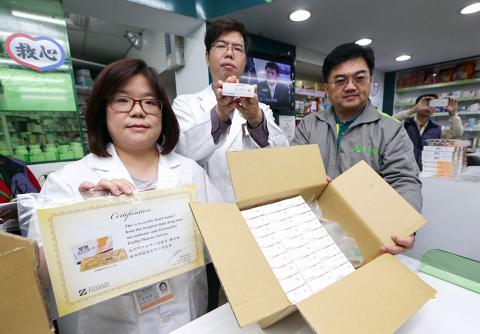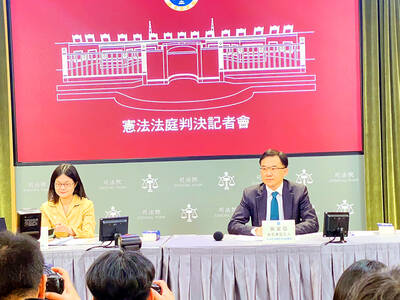Counterfeit batches of Crestor brand lipid-lowering drugs contained ingredients from Chinese pharmaceutical producers, Minister of Health and Welfare Chen Shih-chung (陳時中) said yesterday after being subjected to a barrage of questions from a lawmaker.
A recall was issued on Tuesday for all of AstraZeneca’s Crestor tablets following a discovery last week that two batches of the drug prescribed to 570,000 National Health Insurance patients were counterfeits made from atorvastatin, a cheaper drug whose patent had expired.
The Ministry of Health and Welfare did not release any information regarding the quantity, distribution or origin of the fake drugs until yesterday, when Democratic Progressive Party Legislator Liu Chien-kuo (劉建國) grilled Chen on the issue during a legislative session.

Photo: CNA
Following Liu’s questions, Chen said that the fake drugs’ ingredients were mailed from China to Taiwan, but the identity of many individuals involved in their production and distribution remained unknown to authorities.
The ministry is considering sending investigators to China, Chen said, adding that judicial authorities have taken charge of the investigation.
Liu said that the majority of the imported products seized by the Food and Drug Administration at customs offices for being counterfeits or failing to meet safety standards originated in China.
Separately yesterday, Premier Lin Chuan (林全) pledged to comprehensively overhaul the nation’s drug safety standards during a meeting he chaired at the Executive Yuan.
“This incident is a test for our entire medical safety system and especially for the ministry’s agencies responsible for protecting the nation’s drug safety, as it will show whether their work has won the public’s trust,” Lin said. “We must use this opportunity to completely re-evaluate our performance.”
The primary suspect involved in counterfeiting the drug has been apprehended, Lin said, acknowledging the efforts of police, prosecutors and the ministry to hold the suspect accountable.
The government has requested the assistance of the pharmaceutical sector in recalling and replacing the affected products, he added.
The ministry must ensure the complete recovery and destruction of the fake drugs, and it must make information available to avoid an unnecessary panic, Lin said, adding that an inspection of all commonly prescribed and high-value pharmaceuticals would begin immediately.
Lin said the Cabinet would at the earliest opportunity review existing procedures, including those for dealing with fake drugs; tracking the production and distribution of medicines; quality control regulations; hospital inventory inspections; the mechanism for reporting fake drugs; and methods for their disposal.
The government must protect the public’s access to safe medicines that are essential for public health, uphold the nation’s reputation for effective regulation of medical products and restore public confidence in the government, he added.

The US government has signed defense cooperation agreements with Japan and the Philippines to boost the deterrence capabilities of countries in the first island chain, a report by the National Security Bureau (NSB) showed. The main countries on the first island chain include the two nations and Taiwan. The bureau is to present the report at a meeting of the legislature’s Foreign Affairs and National Defense Committee tomorrow. The US military has deployed Typhon missile systems to Japan’s Yamaguchi Prefecture and Zambales province in the Philippines during their joint military exercises. It has also installed NMESIS anti-ship systems in Japan’s Okinawa

TRAGEDY STRIKES TAIPEI: The suspect died after falling off a building after he threw smoke grenades into Taipei Main Station and went on a killing spree in Zhongshan A 27-year-old suspect allegedly threw smoke grenades in Taipei Main Station and then proceeded to Zhongshan MRT Station in a random killing spree that resulted in the death of the suspect and two other civilians, and seven injured, including one in critical condition, as of press time last night. The suspect, identified as a man surnamed Chang Wen (張文), allegedly began the attack at Taipei Main Station, the Taipei Fire Department said, adding that it received a report at 5:24pm that smoke grenades had been thrown in the station. One man in his 50s was rushed to hospital after a cardiac arrest

ON ALERT: Taiwan’s partners would issue warnings if China attempted to use Interpol to target Taiwanese, and the global body has mechanisms to prevent it, an official said China has stationed two to four people specializing in Taiwan affairs at its embassies in several democratic countries to monitor and harass Taiwanese, actions that the host nations would not tolerate, National Security Bureau (NSB) Director-General Tsai Ming-yen (蔡明彥) said yesterday. Tsai made the comments at a meeting of the legislature’s Foreign Affairs and National Defense Committee, which asked him and Minister of National Defense Wellington Koo (顧立雄) to report on potential conflicts in the Taiwan Strait and military preparedness. Democratic Progressive Party (DPP) Legislator Michelle Lin (林楚茵) expressed concern that Beijing has posted personnel from China’s Taiwan Affairs Office to its

‘ILLEGAL RULING’: The KMT and the TPP slammed the Constitutional Court judgement, saying it contravened the law and was trying to clear the way for a ‘green dictatorship’ The Constitutional Court yesterday ruled that amendments to the Constitutional Court Procedure Act (憲法訴訟法) passed by the Legislative Yuan last year are unconstitutional, as they contravene due legislative process and separation of powers. The Legislative Yuan on Dec. 20 last year passed amendments stipulating that no fewer than 10 grand justices must take part in deliberations of the Constitutional Court, and at least nine grand justices must agree to declare a law unconstitutional. The Executive Yuan on Jan. 2 requested that lawmakers reconsider the bill, but the Legislative Yuan, under a combined majority of Chinese Nationalist Party (KMT) and Taiwan People’s Party